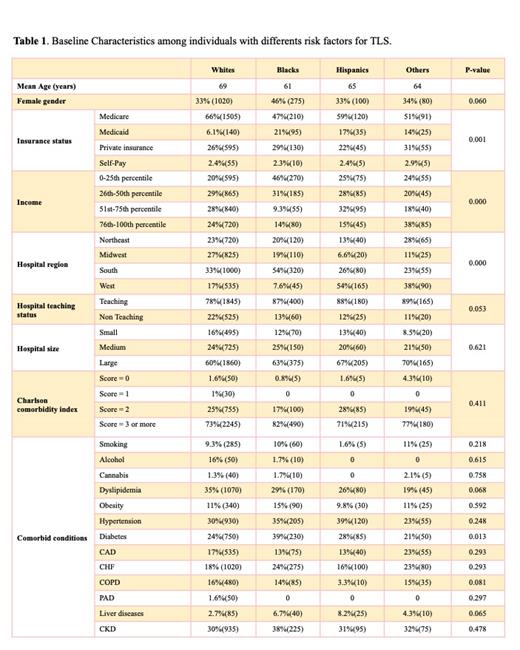DISCUSSION
Tumor lysis syndrome (TLS) is a potentially life-threatening complication that occurs in the setting of rapid tumor cell destruction. While several studies have explored the risk factors and management strategies for TLS [1], the impact of racial disparities on the incidence, severity, and outcomes of this syndrome remains understudied. We aim to investigate the impact of race on the outcomes of TLS.
Using weighted data from the Nationwide Inpatient Sample (NIS) database from 2016 to 2020, we assessed the outcomes (mortality, hospital utilization, total healthcare charges, complications) of individuals admitted with a primary diagnosis of TLS among races (non-Hispanic Whites, non-Hispanic Blacks, Hispanics, and Others including Native Americans, Asians, and other races/ethnicities). Baseline characteristics (table 1) were analyzed using T-test and Chi-Square, and a multivariate regression analysis was used to estimate outcomes between races, adjusted for patient and hospital confounders. Data analysis was performed using STATA® Version 17.0/SE Software, with statistical significance set at p < 0.05.
A total of 4340 were admitted with a primary diagnosis of TLS from 2016 to 2020. Among these, Blacks were the most prevalent (46%), followed by others (34%), Hispanics and whites (33% each). There was no significant difference in comorbid conditions between races. Moreover, no significant differences in the total healthcare expenditures or length of hospital stays were found among races. Pertaining to TLS outcomes, When compared to Whites, Blacks had a statistically significant increase in mortality (OR 2.35, 95%CI: 1.14-4.87). Considering manifestations of TLS, Others (Native Americans, Asians, and other races/ethnicities) had an increased likelihood of cardiac arrest (OR 9.14, 95%CI: 1.11-75.6). No statistically significant difference between races was found for gastrointestinal (GI) bleeding, acute kidney injury (AKI) or sepsis.
Our study highlights racial disparities in the outcomes of individuals hospitalized with TLS, including increased mortality in Blacks, and cardiac arrests in Others (Native Americans, Asians, and other races/ethnicities). Interestingly, there were no statistically significant differences in GI bleeding, or sepsis, which are commonly associated with increased mortality in TLS. Further investigations are warranted, particularly through prospective or retrospective studies, to elucidate the underlying factors contributing to these disparities.
Disclosures
No relevant conflicts of interest to declare.


This feature is available to Subscribers Only
Sign In or Create an Account Close Modal